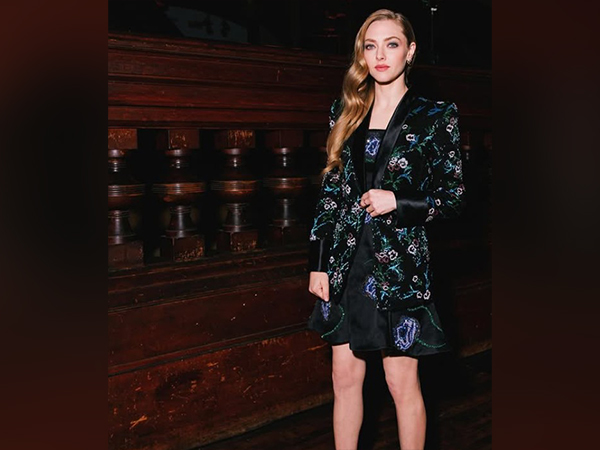Amanda Seyfried says Paramount owes her ‘some money’ after using her ‘likeness’ for Mean Girls merch, and the internet is buzzing. In a recent conversation making waves across the entertainment world, the Mean Girls actress expressed clear frustration over the continued commercial use of her image—particularly on T-shirts and memorabilia—without appropriate compensation. Seyfried, who played the iconic and hilariously ditzy Karen Smith in the 2004 teen comedy, is calling out the studio for failing to share profits generated from her image, still widely used in official merchandise over two decades later.
This revelation is reigniting industry-wide discussions about performers’ likeness rights, royalties, and how outdated contracts often leave legacy actors shortchanged, even when their characters remain pop-culture icons.
“I Really Love It, But…” — Seyfried’s Likeness and the Merch Debate
Amanda Seyfried says Paramount owes her ‘some money’ after using her ‘likeness’ for Mean Girls merch, and she’s not mincing words. She expressed appreciation for the film’s lasting legacy and fan love—especially seeing herself on T-shirts worn by strangers in airports and malls. However, she also noted the underlying unfairness: she’s receiving no share of the profits from that merchandise.
This isn’t a simple complaint; it’s a legitimate issue of intellectual property. While fans might see the merch as nostalgic fun, for Seyfried it’s a reminder that her face is making someone money—and it’s not her. She emphasized that back when she signed her contract, she was a teenager without the legal understanding or leverage to demand better terms. Now, as a seasoned actress and public figure, she’s using her platform to call attention to the disparity.
Unpacking the Industry Implications
Amanda Seyfried says Paramount owes her ‘some money’ after using her ‘likeness’ for Mean Girls merch, but this case could lead to more than a single settlement. Her comments underscore a deeper problem in Hollywood: how actors are often locked into deals that ignore long-term merchandising potential. This especially affects actors who were minors when their contracts were signed, a category Seyfried fell into at the time of Mean Girls.
Today, merchandising is a major revenue stream. From streaming services to apparel to themed dolls and Funko Pops, franchises live on through consumer products. Yet many of the actors who brought those franchises to life are left behind financially. Seyfried’s case could spark a broader call for royalty renegotiations—especially when merchandise continues to dominate pop culture.
The Business of Nostalgia: Who Gets Paid?
Let’s break down what’s really at stake:
- What’s being sold: Shirts, hoodies, accessories, mugs, dolls—anything featuring Karen Smith’s famous “I can feel it in my boobs” face.
- What Amanda wants: Fair compensation for ongoing use of her likeness tied directly to her performance.
- What fans see: A beloved character on cool merch.
- What’s missing: Profit-sharing with the face that made it iconic.
Despite Mean Girls being nearly two decades old, its memes and characters remain part of daily internet culture. Paramount has capitalized on this longevity through merchandise, spin-offs, and most recently, a new musical adaptation. Yet, Seyfried’s recent remarks suggest she hasn’t received even a small cut from those products.
Beyond Amanda: Why This Matters for All Performers
Amanda Seyfried’s situation is far from unique. Many actors from early-2000s and ’90s films signed away likeness rights in ways that would later cost them millions. The rise of nostalgic merchandise has transformed past roles into permanent branding tools. Performers today are beginning to question the fairness of those early deals.
Young actors especially need to understand the power of likeness rights. Studios are now more savvy than ever about turning characters into global brands. What might look like a throwaway clause in a teenage actor’s contract can translate into lifelong merchandising revenue—for the studio.
Will Amanda Take Legal Action?
While no lawsuit has been filed yet, Amanda’s public remarks might be the first step in either a renegotiation or a formal audit of the earnings generated through her image. If this moves forward legally, it could set a precedent for how contracts are reexamined when merchandise profits continue years after release.
At the very least, it sends a powerful message to studios: fair pay doesn’t end with a film’s release. When a character’s image still sells in stores or online marketplaces decades later, the actor behind that character deserves a share of the success.
Looking Forward: A Changing Landscape
Amanda Seyfried says Paramount owes her ‘some money’ after using her ‘likeness’ for Mean Girls merch, and her voice adds to a growing chorus of actors demanding fair treatment in an ever-evolving entertainment economy. While the world of content and streaming has shifted, merchandise remains one of the most powerful—and profitable—tools for legacy media.
As this story develops, it could influence how future contracts are drafted and how existing agreements are interpreted. For fans, it’s a peek behind the curtain into how Hollywood works. For performers, it’s a reminder that their face, voice, and image are valuable assets that should be respected and compensated fairly.
Fans of Mean Girls and Amanda Seyfried alike should support performers standing up for fair pay. Next time you see a shirt with “Karen Smith” on it, ask: did Amanda get her cut? If not, maybe it’s time she did.
Let your voice be heard on social media—should studios pay actors for merch that uses their faces? Sound off today.
